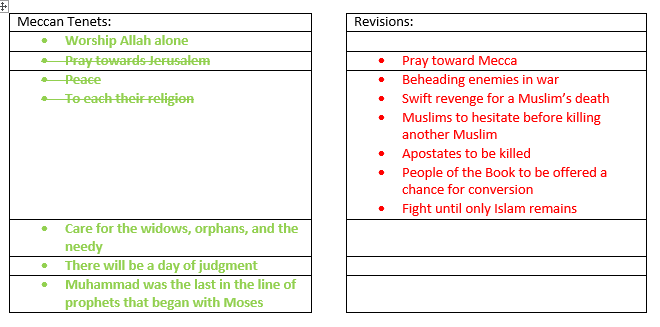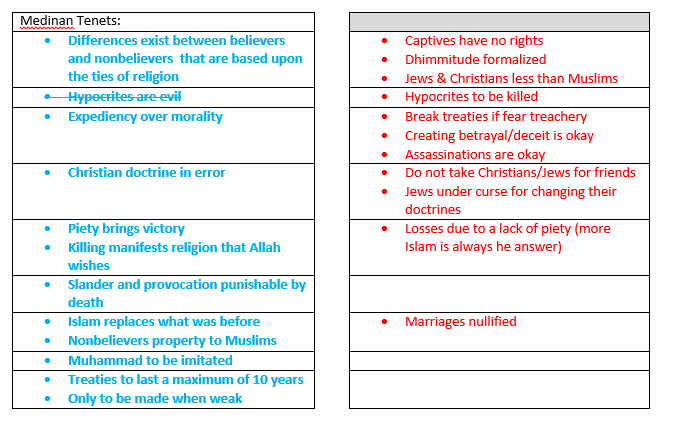 by Dan Wolf
by Dan Wolf
This article will begin where the last one left off, with the migration of Muslims from Mecca to Medina in 622. The focus will be on the changes to the tenets outlined in the last article. Medina was home to eight Arab and three Jewish clans, including the Ansar who had pledged their loyalty to Muhammad. The Jewish clans were the Banu Qaynuqa, the Banu Nadir, and the Banu Qurayza, and each had formed alliances with various Arab clans. The references below indicate either a section number within the sirat (number only), or a verse within the Qur’an (Numbers preceded by an S).
The Medina Constitution
One of Muhammad’s first actions in Medina was to create an agreement referred to as the Constitution of Medina, and Muslims point to this document as the world’s first constitution. Below are some of its contents.
‘This is a document from Muhammad the prophet (governing the relations) between the believers and Muslims of Quraysh and Yathrib (Medina), and those who followed them and joined them and labored with them. They are one community (umma) to the exclusion of all men…
‘Believers shall not leave anyone destitute among them by not paying his redemption money or bloodwit in kindness.
‘A believer shall not take as an ally the freedman of another Muslim against him. The God-fearing believers shall be against the rebellious of him who seeks to spread injustice, or sin or enmity, or corruption between believers; the hand of every man shall be against him even if he be a son of one of them. A believer shall not slay a believer for the sake of an unbeliever, nor shall he aid an unbeliever against a believer. God’s protection is one, the least of them may give protection to a stranger on their behalf. Believers are friends one to the other to the exclusion of outsiders. To the Jew who follows us belong help and equality. He shall not be wronged nor shall his enemies be aided … The believers must avenge the blood of one another shed in the way of God … Whosoever is convicted of killing a believer without good reason shall be subject to retaliation unless the next of kin is satisfied (with blood-money) …
‘The Jews shall contribute to the cost of war so long as they are fighting alongside the believers. The Jews of the B.’Auf are one community with the believers (the Jews have their religion and the Muslims have theirs) … The contracting parties are bound to help one another against any attack on Yathrib. If they are called to make peace and maintain it they must do so; and if they make a similar demand on the Muslims it must be carried out except in the case of a holy war.’ (341 – 344)
This document laid out the foundation for the following additions to Islam:
- All Muslims are members of a single brotherhood (umma)
- Distinctions are made between believers and non-believers in terms of their rights and obligations
- Believers are obliged to avenge the blood of another believer, and not to assist a non-believer against a believer.
- The Jewish clans were to contribute to the costs of war and to fight alongside the believers – with one exception in the case of a holy war. These conditions laid the initial foundation for the later formation and treatment of the dhimmis (protected peoples). These conditions would change with subsequent revelations.
While the agreement was drawn up between Muhammad’s followers and the Medinans, as noted above there were also provisions for the Jewish clans – even though they did not participate in the discussions or agree with the document’s contents.
Relations with the Jews and the Hypocrites
Relations with the Jewish clans worsened, and they began to annoy Muhammad with questions of a religious nature. One of the rabbis is said to have converted to Islam, and was denounced by the Jewish clans. The sirat asserts that this rabbi declared Muhammad’s appearance as a prophet was foretold in the Torah (354). This has become a basis for claims by Muslims that the Jews and Christians have altered their scriptures in order to discredit Muhammad. We will look at that charge in another article. There also arose a defection of some of the early Muslim converts (the Hypocrites) who began to work with the Jewish clans against Muhammad (355 – 400). Sura 63 is devoted entirely to denouncing the hypocrites, and Sura 2 also contains verses relevant to the events from this time.
It was during this time that Muhammad wrote a letter to the Jews of Khaybar, stating that he was the apostle of God and urging them to accept his teachings. Muhammad urged them to search their scriptures to see if they should believe him. ‘If you do not find that in your scripture then there is no compulsion on you.’ (376-7)
Christian Delegation from Najran
A delegation of Christians came from Najran to discuss theology with Muhammad. From the beliefs associated within this group by the sirat, it is likely that they were gnostics as the story from the Gospel of Thomas where Jesus breathed into some clay birds and them coming to life is mentioned. This delegation arrived about the same time as the letter was sent to Khaybar and the disputes between the Jews and Muhammad in Medina noted above. Muhammad attempted to correct their errors. Some of the corrections included:
- Your assertion that God had a son, your worship of the cross, and your eating of pork hold you back from submission [to God]. (403)
- A revelation that Jesus himself would deny the doctrine of the trinity. ‘And when Allah says: O Jesus, son of Mary! Did you say unto mankind: Take me and my mother for two gods besides Allah? He says: Be glorified! It was not mine to utter that to which I had no right.’ (S5.116)
- Jesus was not God as he could not do all that God did. ‘All that I withheld from Jesus and gave him no power over it. Have they not an example and a clear proof that if he were a God all that would be within his power.’ (406)
- The creation of Jesus was no different from the creation of Adam. Jesus was not divine and was not crucified; it only appeared that he was slain to them. (409)
- Christians had received these beliefs because they had strayed from what Jesus actually taught. (410)
- Muhammad called for both Jews and Christians to become Muslims and accept his teachings, and the restoration of the original message of Jesus. (405 and 410)
- Believers should not choose those outside your community as intimate friends. ‘ They will spare no pains to corrupt you longing to ruin you.’ (388)
It was also at this time that the direction for prayer was changed from Jerusalem to Mecca. (427) Muhammad began to criticize the Jews for not accepting his teachings.
Raid During Ramadan
Initially Muhammad and his followers were supported by the Ansar, but this condition could not last. The cultivatable land was already in use and his followers did not have enough wealth to support themselves. Muhammad organized raids against caravans traveling to Mecca to collect booty and take captives to be held for ransom. These were unsuccessful at first, but finally succeeded when a caravan was attacked during the sacred month of Ramadan. The raiding party was faced with a choice of fighting during the last day of Ramadan, or letting the caravan go another day which would allow it to reach the sanctuary of Mecca.
After the attack, Muhammad received the following revelation concerning the event. ‘They will ask you about the sacred month, and war in it. Say, war therein is a serious matter, but keeping people from the way of God and disbelieving in Him and in the sacred mosque and driving out His people therefrom is more serious with God.’ (S2.216-7 and 425) If you have killed in the sacred month, they have kept you back from the way of God with their unbelief in Him. (425)
This event set several more precedents.
- Muhammad was not only attacking during a month considered sacred when no bloodshed was to take place, but he was also attacking his own tribe. These raids, along with the conditions of the Medinan Constitution noted previously, set the stage for replacing the bonds of kinship with the bonds of belief.
- Raiding and taking booty had been a part of nomadic life for a long time. The above revelation made these actions good and lawful as they helped Islam.
- Expediency in the advance of Islam trumps morality.
Battle of Badr
A large caravan was returning to Mecca from Syria. Muhammad called for volunteers to raid it, and about 300 set out from Medina. The Meccans learned of the plans and set out with a much larger force to intercept and destroy Muhammad. The caravan feared an attack and went straight to Mecca. Some of the Quraysh returned to Mecca when they learned the caravan was safe, but the rest rode on to meet Muhammad’s party. They were routed by Muhammad at Badr. About 75 Meccans died and another 70 were taken prisoner. Muhammad took one fifth of the booty as had been prescribed for him in a previous revelation (425), and proclaimed that the angels had assisted the Muslims in the fight because of their piety.
From Ibn Ishaq’s sirat, the prisoners were held for ransom. A quarrel broke out over how to distribute the booty. When Muhammad set out on the raid, it was with the belief that either the party or its property was to be his. As part of the surah that came down regarding the quarrel, it is recorded that “‘when God promised you that one of the parties should be yours, and you wanted to have the one that was not armed.’ i.e. Booty and not war… God wanted to establish the truth by His words, and to cut off the uttermost part of the unbelievers.” (476-7) When Muslims met unbelievers in battle, they were not to turn their backs on them (477), and they were to fight them until there was no more persecution, and religion, all of it, shall belong to God. (480) If an unbeliever ceased to fight they would be pardoned, but if they returned to fight the Muslims again that ‘the example of the ringleaders has been made.’ i.e., those who had been killed at Badr. (480)
Muhammad was reproached by Allah for taking booty, something that he said no prophet had been allowed before him. Muhammad received a revelation that ‘booty was made lawful to me as to no prophet before me; and I was given the power to intercede; five privileges accorded to no prophet before me. God said, ‘It is not for any prophet (before thee) to take prisoners from his enemies until he has made slaughter in the earth … “God desires the next world”, i.e. their killing them to manifest the religion which He wishes to manifest and by which the next world may be attained.’ (484)
The hadith of Sahih Muslim, presents this event somewhat differently. After the battle, an argument ensued over what to do with the prisoners. Abu Bakr stated they were their kin and should be released after receiving a ransom. Umar disagreed and thought they should be executed. Muhammad sided with Abr Bakr. The next day Muhammad was distraught, saying he had received a revelation that Allah had sided with Umar and scolding Muhammad for taking booty instead. However, since Muhammad had previously been allowed to take booty, he was forgiven. Muhammad took revenge on several prisoners who had belittled him in Mecca, having them beheaded for their remarks against him.
Some of the precedents coming from this event included:
- Piety will bring victory.
- I will reinforce you with a thousand angels, one behind the other. (477)
- Beheading of enemies taken in war, and the taking of captives only after war has ceased.
- Now when you meet in battle those who disbelieve, then it is smiting of the necks until, when you have routed the, then making fast of bonds; and afterward either grace or ransom till the war lay down its burdens. (S47.4)
- The killing of nonbelievers serves to manifest the religion Allah wished to create and facilitated attaining paradise after death.
The Banu Qaynuqa
After the Battle of Badr, the scope and frequency of the raids increased. Muhammad received the following revelation. ‘And if you fear treachery from any folk, then throw back to them (their treaty) fairly.’ (S8.58) He assembled the Qaynuqa in the marketplace and addressed them saying, ‘O Jews, beware lest God bring upon you the vengeance that He brought upon Quraysh and become Muslims. You know that I am a prophet who has been sent−you will find that in your scriptures and God’s covenant with you.’ (545)
The Qaynuqa could not comply, and Muhammad laid siege to them until they asked for an unconditional surrender. At that time some of the Muslims that had alliances with the Qaynuqa came forward to plead on their behalf. Muhammad wanted to put all of the men to death, but one of Muhammad’s followers caught him by the collar of his robe until he agreed to deal with them mercifully. They were allowed to leave as long as they left all of their property behind. (545 – 6)
At this time Muhammad received several new revelations, reinforcing Muslims only having relationships with other Muslims:
- Take not Jews and Christians as friends. They are friends one of another. (S5.51)
- In regard to the Jews specifically, ‘And because of their breaking their covenant, We have cursed them and made hard their hearts. They change words from their context and forget a part of that whereof they were admonished.’ (S5.13)
- If the hypocrites, and those in whose hearts is a disease, and the alarmists in the city do not cease, We verily shall urge you on against them, then they will be your neighbours in it but a little while. Accursed, they will be seized wherever found and slain with a (fierce) slaughter. (S33.60-1)
The Assassination of Ka’b
The options for those nonbelievers living in Medina became conversion, expulsion, or death. Muhammad next turned his attention to several enemies. The first was a Jewish poet Ka’b bin Al-Ashtaf, who had composed verses lamenting the Quryashi loss at Badr and insulting Muslim women. Muhammad asked, ‘Who is willing to kill K’ab bin Al-Ashtaf who has hurt Allah and his Apostle?’ A Muslim volunteer offered to kill him, and Muhammad replied ‘Do so if you can.’ After fasting for three days, the volunteer did not know if he could fulfill his commitment as he would have to tell lies to accomplish it. Muhammad answered, ‘Say what you like, for you are free in the matter.’
The volunteer went to Ka’b and complained about Muhammad, asking for Ka’b’s help in breaking away from Islam. They struck a deal and the Muslim returned to Ka’b’s house that night with others, where they proceeded to slay him and presented his head to Muhammad. The Jews were outraged, but Muhammad reminded them that the Muslims were provoked by Ka’b’s actions. ‘There was no Jew in Medina that did not fear for his life.’ (550-3) After the murder of Ka’b, Muhammad issued the command to ‘Kill any Jew that falls into your power.’ (553)
Later on, Muhammad asked for someone to kill the poetess Asima and the aged poet Abu Afak. Asima was killed in her sleep after composing verses against Muhammad and Islam. Muhammad asked, If there was no one to rid him of this daughter of Marwan.’ Muhammad praised her killer and assured him that ‘two goats won’t butt their head about her.’ The next day her entire family converted to Islam. (996) Abu Afak had composed verses against Muhammad and the way he attempted to control others lives. Muhammad asked, ‘Who will deal with this rascal for me?’ One of the Muslims went out and slayed the poet. (995) In all it appears there were thirty to forty individuals whose deaths were either ordered or supported by Muhammad.
New precedents:
- That which advances Islam is good, including lies, deceit, and murder.
- Disparaging remarks against Muhammad or Islam are punishable by death.
The Battle of Uhud
The Meccans assembled an army of about 3,000 men to attack the Muslims. Muhammad led an army of about 1,000 and met them at the mountain of Uhud. Some of the Muslims had asked Muhammad if they needed the help of their Jewish allies. Muhammad replied that they were not needed. The Muslims were routed at Uhud and Muhammad was hurt. Muhammad swore revenge when the body of an uncle was found that had been mutilated by a Meccan woman who was taking revenge for her family being killed at Badr.
In reaction to Muhammad’s oath, the Muslims also swore revenge on the Meccans. Muhammad stated he would not take revenge on his uncle’s killer if he became a Muslim. The person who killed his uncle converted to Islam. Muhammad asked him to recite how he had killed his uncle, which the convert did. After the story was completed, Muhammad told him to never let him see him again if he wanted to live. (555 – 606)
Precedents established by this event include:
- Any attack calls for swift and fierce revenge.
- Muslims will hesitate to kill other Muslims, but not hesitate to kill nonbelievers.
- Losses are due to not obeying Allah. Whatever occurs, the answer is always that more Islam is needed. (also S3.130-2)
The Banu Nadir
After returning to Medina, Muhammad went to the Nadir to ask for their help in paying the bloodwit for several men. They agreed, and the sirat says that some of later plotted to kill Muhammad. Muhammad was warned of what they intended and returned to Medina. He marched against the Nadir and ordered that their palm-trees should be cut down and burned. Some of their Arab allies told them to ‘Stand firm and protect yourselves, for we will not betray you.’ (653) However, the allies did not come to the aid of the Jews. When some of the Nadir reminded the Aws of the alliance that the two tribes had, the Jews were told, ‘Hearts have changed, and Islam has wiped out the old covenants.’ (Tabari) The Nadir asked Muhammad to spare them by deporting them with only the property they could carry on their camels – except for their weapons. The Nadir’s property became the personal property of Muhammad. (652–6)
The Battle of the Ditch and the Banu Qurayza
The Meccans learned that they had not ended Muhammad’s rule in Medina. They were approached by representatives of the last remaining Jewish tribe within Medina, the Qurayza, to form an alliance against Muhammad. They also approached the Ghatafan tribe with the same offer. Both accepted to march against Muhammad in support of the Qurayza. Muhammad learned of the planned attack and ordered a trench be dug around the city of Medina.
The Muslims were pressed into service in order to dig the trench. During this time Muhammad had visions of taking other territories beyond Arabia. The Quraysh and Ghatafan came against Medina with an army of more than 10,000 and they were met by a Muslim army of about 3,000. The attackers were unable to penetrate the defenses, but the Muslims were also unable to break the siege. At this time Muhammad heard reports that the Qurayza were supporting the attackers, and sent spies to determine if the Jews had actually broken the agreement they had with Muhammad. The people he sent reported that the situation was worse than expected.
A Ghatafan convert to Islam approached Muhammad and offered to do whatever he ordered. The apostle said, ‘You are only one man among us, so go and awake distrust among the enemy to draw them off us if you can, for war is deceit.’ (681) The individual was able to create distrust among the allies and the Arabs withdrew when they could not penetrate Medina’s defenses.
After the siege was broken, Muhammad turned his attention to the last Jewish tribe remaining in Medina. He besieged them for twenty five days, after which they agreed to submit to Muhammad’s judgment on the condition that their fate be determined by a member of their allies the Aus. Muhammad selected a man from that clan, who gave the following decision. ‘Then I give judgement that the men should be killed, the property divided, and the women and children taken as captives.’ (689) Muhammad had trenches dug in the marketplace. The men were brought out five or six at a time and beheaded. ‘There were 600 or 700 in all, though some put the figure as high as 800 or 900.’ (690) Torches were lit so that the executions could be completed in one day. Muhammad chose to comfort himself with Rayhana, whose husband and all male relatives had been executed just hours before. He offered to marry her, but she refused. (693) A revelation was received sanctioning the Qurayza’s punishment. (S33.25-28)
Muhammad taught that nobility lay in forgiveness, and that restraining anger and pardoning men was well-doing. However, he failed to practice this. Instead, he promoted:
- Using any means necessary to advance Islam, including deception and lies.
- Creating betrayal and then avenging the acts in order to further his aims.
- Fighting those who did not accept Muhammad’s teachings or his being a prophet, and any captives taken having no rights unless they converted to Islam.
- Solidified the use of these methods through a revelation from Allah that Muslims should imitate him. ‘Surely in the Messenger of Allah you have a good example for him who looks unto Allah and the last Day, and remembers Allah much.’ (S33.21 and 695)
The Raid on the Al Mustaliq
Muhammad received word that a tribe related to the Quraysh, the Al-Mustaliq, was gathering to attack him at Medina. Muhammad went out and attacked them first, taking much of their property, women, and children. Muhammad’s men wanted the women for themselves, and also wanted to hold them for ransom as well. The Qur’an already allowed Muslims to have intercourse with women taken in battle if they were being taken as slaves, but they could not also claim ransom for them. Muhammad received the following revelation regarding the prohibition against having intercourse with women to be held for ransom, ‘it does not matter if you do not do it, for every soul that is to be born up to the Day of Resurrection will be born.’ (hadith of Al-Bukari)
Arising from this event:
- When a women is taken captive her previous marriage becomes annulled.
The Armistice with Mecca
Before the raid on Khaybar (see below), the Quraysh sent a representative to Muhammad to make peace. The Treaty of Hudaybiyya was to last for ten years, and it allowed the Muslims to go on pilgrimage to Mecca during the month of Ramadan. An additional term of the agreement was that any Meccan going to Medina without their guardians permission was to be returned to Mecca, while any Muslims going to Mecca were not. The Muslims were shocked and upset, but Muhammad received several revelations supporting his decision and the treaty.
Before too long, a woman named Umm Kulthum came from Mecca to become a Muslim. Her two brothers came to take her back, but Muhammad refused. He had received a revelation that Allah forbade returning her to Mecca. In reality, this event broke the treaty, but Muhammad decided to send his followers against the oasis of Khaybar shortly after this time. He went on the pilgrimage to Mecca in 629 with some of his followers. Shortly thereafter, he had the occasion he needed to attack Mecca. Some allies of Mecca skirmished with some of Muhammad’s allies. He marched on Mecca in 630 with an army of about 10,000 men. The city surrendered on the condition that they would be spared.
From the sirat, ‘The apostle had instructed his commanders when they entered Mecca only to fight those who resisted them, except a small number who were to be killed even if they were found beneath the curtains of the Ka’ba. Among them was ‘Abdullah b. Sa’d … The reason he ordered him to be killed was that he had been a Muslim and used to write down revelation; then he apostatized and returned to Quraysh … Uthman b.’Affan hid him until he brought him to the apostle after the situation in Mecca was tranquil, and asked that he might be granted immunity. They allege that the apostle remained silent for a long time till finally he said yes. When Uthman had left he said to his companions who were sitting around him, ‘I kept silent so that one of you might get up and strike off his head!’ One of the Ansar said, ‘Then why didn’t you give me a sign, O apostle of God?’ He answered that a prophet does not kill by pointing. (818–9)
The following principles evolved from these actions:
- Treaties between Muslims and nonbelievers are to last no longer than ten years. It is no coincidence that the recent agreement with Iran only lasts for ten years.
- Treaties were only to be made with nonbelievers when the Muslims were in the weaker position, and to allow them to get strong enough to defeat their enemies.
- Apostates were to be killed. Also from the Qur’an, ’They long that you should disbelieve even as they disbelieve, that you may be upon a level (with them). So choose not friends from them till they forsake their homes in the way of Allah; if they turn back (to enmity) then take them and kill them wherever you find them, and choose no friend nor helper from among them.’ (S4.89)
The Jews of Khaybar
Muhammad moved against Khaybar with about 1,600 men. None of Khaybar’s allies decided to come to their aid. The forts fell one at a time until the Muslims took Khaybar itself. Many of the Nadir who had fled Medina earlier, had migrated to Khaybar. The Jewish leader who had custody of the Nadir’s treasure was brought to the apostle ‘who asked him about it. He denied that he knew where it was … The apostle gave orders that the ruin was to be excavated and some of the treasure was found. When he asked him about the rest he refused to produce it, so the apostle gave orders to … “Torture him until you extract what he has,” so he kindled a fire with flint and steel on his chest until he was nearly dead. Then the apostle delivered him to Muhammad b. Maslama and struck off his head.’ (763-4)
The people of Khaybar were exiled. Some date farmers requested that they be allowed to remain on their farms and offered to give Muhammad half of their crops. He accepted on the condition that the Jews would only be allowed to stay as long as the Muslims allowed it. This marked the beginnings of what would become dhimmitude (protected people). Dhimmi means both ‘protected’ and ‘guilty’. They were protected because they had received genuine revelations. They were guilty because they had corrupted those teachings and had rejected Muhammad as a prophet.
Finally, a woman slave that Muhammad had taken at Khaybar poisoned some meat that was fed to him and his companions. He did not die, but one of his companions did. This occurred in about 628.
The Push for Arabia
After the fall of Mecca, Muhammad learned that the Thaqif tribe was gathering an army to attack him. This tribe was historically a rival of the Quraysh. Muhammad met them with an army of about 12,000. They met near Hunayn. Initially the Thaquif routed the Muslims, but the Muslims were able to turn the tide at great loss of life to both sides. Muhammad then took the town of Ta’if itself. He was lenient with the Thaqif and favored some of the recent converts in an attempt to cement relationships with them. Some of the Muslims complained to him about the booty distribution. ‘The prophet was angry and said, “If justice is not to be found with me then where will you find it?”’ (884)
Later Muhammad sent letters to the rulers of the great powers surrounding Arabia, calling them all to Islam. He made one final attack against the Byzantine at the city of Tabuk. At this time the murders of the last two poets mentioned earlier occurred. In regards to going to war for Islam, Muhammad received the following revelation. ‘Those who believe in Allah and the Last Day ask no leave of you lest they should strive with their wealth and their lives. Allah is Aware of those who keep their duty unto Him. They alone ask leave of you who believe not in Allah and the Last Day, and whose hearts feel doubt, so in their doubt they waver.’ (S9.44-5)
Muhammad received a revelation that commanded the Muslims to fight against the Jews and Christians until they accepted Islam. Christians and Jews were viewed as guilty peoples as they had corrupted the teachings given to them and rejected Muhammad as a prophet. (S9.29) Because of their false beliefs and hoarding, they are not the equal of Muslims and will burn in Hell. (S9.30–5) Also, that due to their disbelief they will not be guided by Allah.
- How shall Allah guide a people who disbelieved after their belief and (after) they bore witness that the Messenger is true and after clear proofs (of Allah’s sovereignty) had come unto them? And Allah guides not wrong-doing folk. As for such, their reward is that on them rests the curse of Allah and of angels and of men combined. There will they abide. Their doom will not be lightened, neither will they be reprieved. (S3.86-8)
With Muhammad’s victories, clans and tribes from all over Arabia came to pay tribute. The nonbelievers were to be offered the opportunity to convert to Islam. If they refused they were to pay tribute. If they refused that, the Muslims were to go to war. (956)
Muhammad became ill a short time later and died in 632. His last words were said to have been, ‘Let not two religions be left in the Arabian peninsula.’ (1021) This is also reflected within the Qur’an by the following two verses. First, fight them so that there be no more seduction, and the religion is Allah’s. (S2.193) Second, Fight against such of those who have been given the Scripture as believe not in the Allah nor the Last Day, and forbid not that which Allah has forbidden by His Messenger, and follow not the religion of truth, until they pay the tribute readily, being brought low. (S9.29)
With the Medinan revelations, Islam changed from a religion of inclusion and sacrifice to an ideology based upon division, fear, and intimidation. Finally, let us look at the changes to Islam’s tenets after the migration to Medina. What is most striking is that these changes occurred in only ten years.
Dan Wolf
See his extensive writings “About Islam”.
Author and speaker, Dan Wolf, is gifted at gathering facts about contemporary subjects and sharing information in a manner that is easy to read and understand. Dan will be posting both historical and current information about Islam and Sharia. Read more articles on his website. He serves as an Advisor on the Virginia Christian Alliance.






